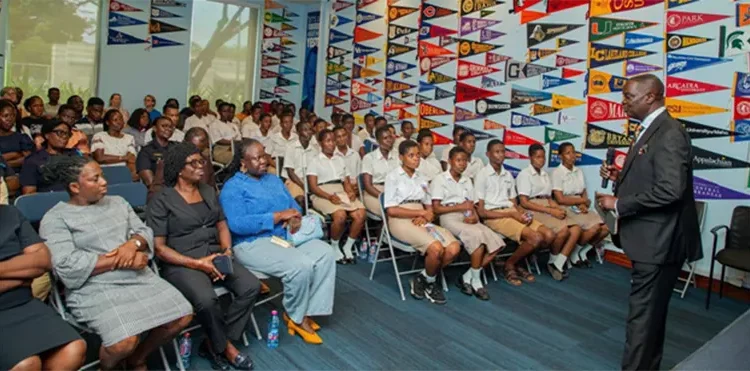Prof. Kwapong addressing participants after the screening
DIRECTOR AND Founder of International Stingless Bee Centre, Prof. Peter K. Kwapong, has called for the immediate halt of galamsey activities in the country, stating that the destruction of the ecosystem in the forest is affecting the ability of bees and other insects to pollinate tree flowers, thereby causing food shortage in the country.
He added that bees play a crucial role in pollination, which is essential for many crops and natural vegetation. As major pollinators, bees significantly impact agricultural production.
“In Ghana, where the economy relies heavily on pollination-dependent crops like cocoa, mango, cashew, oranges, and shea butter, the importance of bees cannot be overstated. Without healthy bee populations, our agricultural production and economy would suffer greatly. Therefore, it’s vital to protect and promote pollination to ensure the sustainability of our agricultural sector,” he said.
He made this statement in an interview with journalists at the American Center for an informative event on “Pollinator Conservation and Honey Tasting” yesterday at the US Embassy Accra. The event featured a film screening, an engaging discussion, and a honey tasting session showcasing both American and Ghanaian varieties.
As a nation of predominantly farmers, Ghana’s livelihood depends heavily on agriculture, which in turn relies on pollinators. While pesticides are necessary to protect crops from pests, it’s crucial to balance their use with the protection of pollinators.
To address this, Mr. Kwapong entreated the government to develop policies supporting beekeepers and regulating pesticide application. “Specifically, farmers could reduce spraying during peak pollination hours when plants are in bloom and bees are active. Instead, spraying could be done in the evenings when bees have returned to their hives, minimising harm to these vital helpers,” he said.
Highlighting on how the youth can leverage on beekeeping as a source of employment, Mr. Kwapong stated that as a country rich in natural resources, no one should live in poverty.
He said Ghana has an abundance of bees in its forests, adding that beekeeping presents a valuable opportunity for the youth, employed or not, to contribute to the economy. “It’s an inclusive venture, not limited to any socioeconomic group. Inspired by countries like Slovenia, Tanzania, and Ethiopia, where beekeeping is widespread, I believe it can significantly boost our economy and provide opportunities for growth,” he stressed.
Henrietta Boateng, 2022 Washington Fellowship for Young African Leaders and founder of Be My Honey, stated that following her leadership program in the US, she has gained insight and experience in beekeeping.
BY Prince Fiifi Yorke


